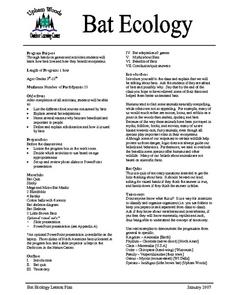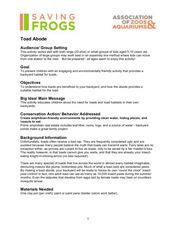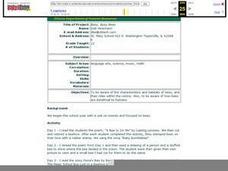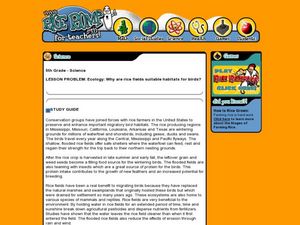Curated OER
Plant Inspection Lab
In this IPM inspection worksheet, students complete a chart observing the phenological events that are observed at each stage of various plants' development.
Curated OER
Arthropod Data Collection
Students describe the life cycle of various bugs as well as their predators and feeding habits. The class participates in a discussion of the various methods scientists use to gather data including research and experiment. After...
Curated OER
Everyone Up!
Students examine various agriculture careers, both direct and indirect, related to crop production and distribution. In this food production activity, students role play the processing chain in which crops move from producer to processor...
Curated OER
Rain Garden
Young scholars build rain gardens. In this community service lesson, students study the effectiveness of rain gardens in allowing water to run off. Young scholars build a community rain garden at their school.
Curated OER
Creating a Pollinator Garden
Young scholars build a pollination garden. In this pollination activity, students read directions and build a pollinator garden that will produce flowering plants for pollinator organisms to use in pollination of other plants.
Curated OER
Peek at the Chesapeake!
Students research organisms that live in the Chesapeake Bay ecosystem. In this science lesson, students choose an organism and research how it is affected by humans. Students create a presentation of their findings.
Curated OER
Bat Ecology
Young scholars, through hands on games and activities, discover how bats live and how bats benefit ecosystems. They play a game designed to show them how echolocation works and another to show how mother bats locate their young through...
Curated OER
Toad Adobe
Students explore the importance of toads and the need for toad habitats in the environment. In this animal habitats lesson, students create an adobe habitat for toads by using a clay pot. Students paint their pots and place them in their...
Curated OER
Animals, Soil, Trees
Fourth graders describe the various kinds of soils and how plants and animals are affected by them. They describe the baic needs of plants, scoring at least a 3 or 4 on a 4-point rubic. Students are able to predict and/or infer what...
Curated OER
Bats and Boas Abound
Students investigate Puerto Rican boa constrictors and bats. For this animal science lesson, students read an article about the bats and snakes found in Puerto Rico. Students use various art supplies to create a diorama of the habitat of...
Curated OER
Busy, Busy Bees
Students role play bees finding nectar. they put on bee tails and antenna. Then 3 or 4 students at a time performed the dances bees do when one is communicating to the others that he has found nectar and the when they are close the...
Curated OER
Ecology: Why Are Rice Fields Suitable Habitats for Birds?
Fifth graders discover the uses for rice by reading about the habitats of certain birds. In this agriculture instructional activity, 5th graders research birds from the Gulf Coast and California and their reasons for living in rice...
Curated OER
Habitat Hopscotch
Students analyze different habitats. In this habitat instructional activity, students evaluate what animals need in their habitats. Students participate in the game Habitat Hopscotch.
Curated OER
The Trial of the Bloody Sucker
Students study creatures that drink blood. In this blood suckers lessons, students watch videos to learn about creatures that drink blood. Students divide into groups and make posters about the organisms. Students then participate in a...
Curated OER
Design a Pollinator
Learners make a scientific drawing of a pollinator with at least five traits that make them well adapted to a given plant(s). They describe in their science notebook the adaptations that make their pollinator well suited to a given plant.
Curated OER
Water Quality Monitoring
Students comprehend the four parameters of water quality. They perform tests for salinity, dissolved oxygen, pH and clarity or turbidity. Students comprehend why scientists and environmental managers monitor water uality and aquatic...
Curated OER
Can Fun Gus Help Plants/Trees Grow?
Students participate in an experiment in which they test the growth of different types of plants. They discover how growth rates vary using inoculum. They draw pictures and are read books about plants to end the instructional activity.
Curated OER
LISTENING TO DIRECTIONS
Students view farm objects or products made from farm animals and follow the oral instructions given by the teacher. They are given worksheets, there are three sets of directions for the one worksheet. Students worksheets have everything...
Curated OER
Second Grade Science Textbooks
Second graders create their own science textbooks. They work in small, cooperative science teams to plan and create their textbooks. In addition, they photograph their group work, projects, materials and specimens, and other images.
Curated OER
Tree Identification
In this tree identification worksheet, students collect samples from different trees and identify them using the deciduous tree guide or the conifer key.
Cornell Lab of Ornithology
Habitat Network: Encouraging Beneficial Insects Pays Off
Find out why insects are an excellent sign of a healthy ecosystem, as they play a vital ecological role.
Iowa State University
Iowa State University: Iowa Insect Information Dragonflies and Damselflies
Dragonflies and Damselflies are some of the most beneficial insects in the whole insect world. Read about the life cycle, history, and other anatomy of these insects.
Smithsonian Institution
Smithsonian Gardens: In Good Company Diversity in the Garden [Pdf]
This site provides insight into the world of insects and gardening. While some insects are considered pests, some are quite beneficial to plants. Learn which plants are known for attracting and sustaining beneficial insects.
Other
Association of Natural Biocontrol Producers
The ANCP site contains information on the history and current research of biological control. This site features profiles of beneficial insects and ANBP events.
























![Smithsonian Gardens: In Good Company Diversity in the Garden [Pdf] Article Smithsonian Gardens: In Good Company Diversity in the Garden [Pdf] Article](https://d15y2dacu3jp90.cloudfront.net/images/attachment_defaults/resource/large/FPO-knovation.png)
